As global stock markets plunged on Monday, US President Donald Trump defended his controversial tariff policies, dismissing concerns over the economic impact. He said that the world leaders are "dying to make a deal" to negotiate the reciprocal tariffs.
With Asian markets opening to significant losses and US futures signalling further declines, Trump sought to downplay fears, suggesting that the market pain caused by his tariffs was a necessary "medicine" to fix longstanding trade imbalances.
On Sunday, Trump denied any intent to deliberately engineer a market selloff, insisting that he could not predict market reactions. He emphasised that he would not enter trade agreements with other countries unless they addressed the trade deficits.
"Sometimes you have to take medicine to fix something," Trump said, referring to the market volatility.
Since the onset of his tariff policies, trillions of dollars in market value have been wiped off the books of US companies, with investors bracing for further fallout.
Trump added that any market adjustment would be "temporary," soft-pedalling the severity of the situation.
Speaking to reporters aboard Air Force One, the US President added that he had been in contact with world leaders over the weekend and claimed that many countries were eager to negotiate a deal.
"They're dying to make a deal," he said, reiterating his stance that tariffs were a necessary tool to level the global playing field.
Despite the steep losses in global markets, which many feared could trigger a full-blown economic downturn, the Trump administration showed no signs of backing off from its aggressive tariff strategy.
China, in particular, announced retaliatory measures, further fueling concerns of an escalating trade war.
Economists have warned that if the US continues on its current path, the global economy could face a severe downturn.
Bruce Kasman, Chief Economist at JPMorgan, put the risk of a recession at 60 per cent, citing the potential for Trump's trade policies to tip a healthy global expansion into a crisis.
The turmoil in the markets has sparked comparisons to the 1987 "Black Monday" crash, which saw global markets lose $1.71 trillion in a single day.
CNBC's Jim Cramer warned that if Trump's trade policies continue, markets could face a similar catastrophic event. As the markets brace for another volatile week, all eyes remain on the White House and the next steps in the ongoing trade conflict.

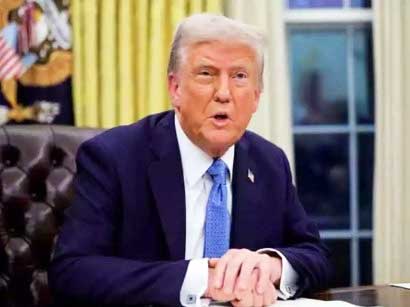
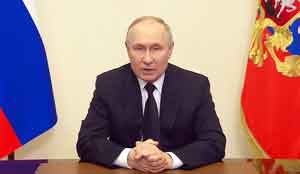
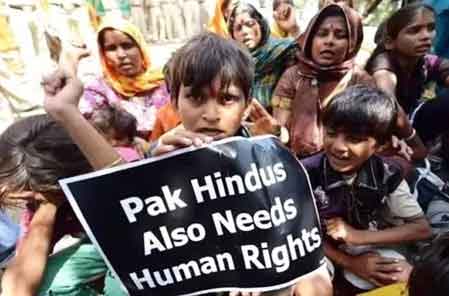
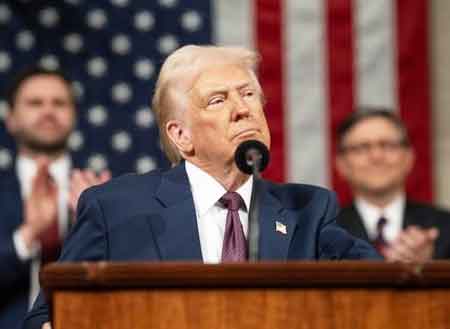
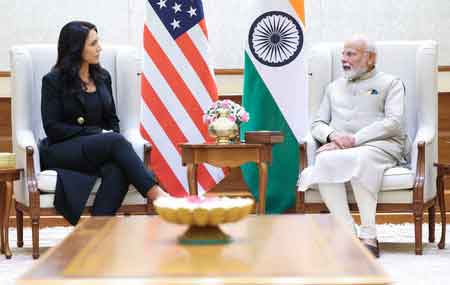


Russia-Ukraine war: Putin announces three-day ceasefire in May to mark Victory Day celebrations
Russian President Vladimir Putin on Monday announced a 72-hour ceasefire in its ongoing 'Special Military Operation' in Ukraine on account of the Victory Day celebrations, next month.
BJP's ally Tipra Motha Party hold protests in Tripura against Bangladesh embankments
The Bharatiya Janata Party's ally Tipra Motha Party (TMP), on Monday, organised massive protests against the construction of embankments by the Bangladesh government along the border with Tripura jeopardising Indian territories during monsoon.
India needs strong action to prevent Pahalgam-like attacks in the future: Farooq Abdullah
National Conference President and former Jammu and Kashmir Chief Minister Farooq Abdullah on Monday strongly condemned the deadly terror attack in Pahalgam, asserting that India demands decisive action to ensure such attacks never recur.
Defence stocks surge over 9 pc as India inks Rs 63,000 crore Rafale deal
Defence stocks saw a strong rally on Monday, climbing over 9 per cent, as the government inked a Rs 63,000 crore deal with France to purchase 26 Rafale Marine fighter jets for the Indian Navy.
'Power projection': India inks Rs 63,000 crore deal with France to buy 26 Rafale fighter jets for Navy
India on Monday signed a landmark Rs 63,000 crore government-to-government deal with France to buy 26 Rafale-Marine fighter jets which will give added punch to the Indian Navy, amid growing security concerns over China flexing its maritime muscle in the Indo-Pacific region.
From Kupwara to Kathua, people came out to protest: CM Omar Abdullah on Pahalgam attack
Jammu and Kashmir Chief Minister Omar Abdullah said on Monday that for the first time, the people of the country are united, and this unity is needed to end militancy and terrorism.
Debt, liquidity of auto parts exporters to stay comfortable despite US tariff hikes: Report
Debt metrics and liquidity are likely to remain comfortable for most auto component exporters despite potential decline in margins and increase in working capital requirements in the wake of the US tariff hikes that have been announced by President Donald Trump, according to an ICRA report released on Monday.
SC issues notice on plea to regulate explicit content on social media, OTT platforms
The Supreme Court on Monday agreed to examine a plea seeking directions to the government to take immediate and decisive action to regulate explicit content on social media and OTT platforms.